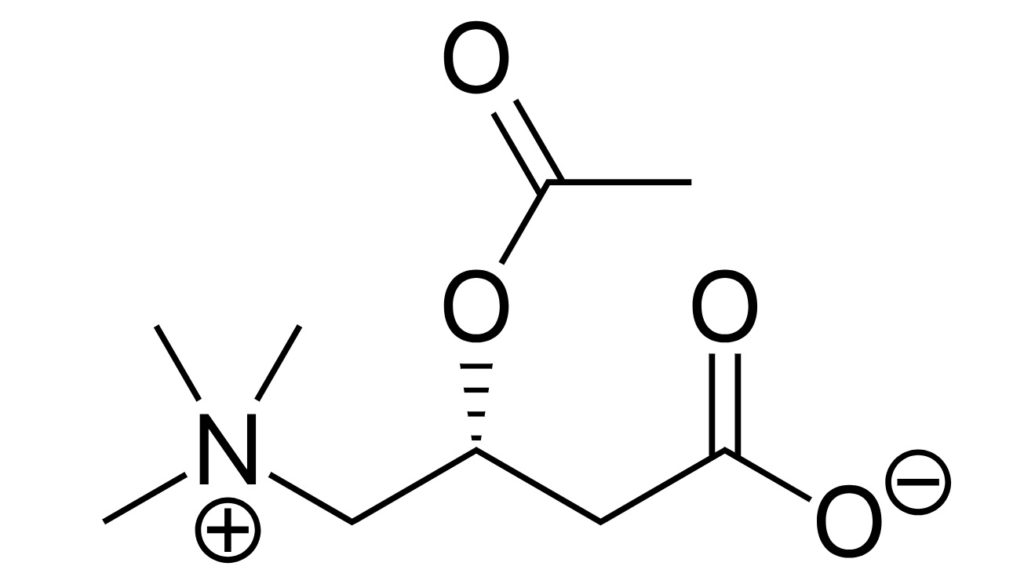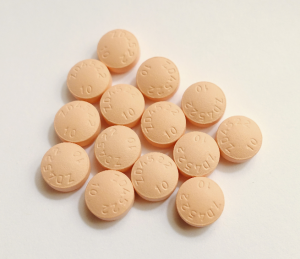Acetyl-L-Carnitine and Mental Health

Carnitine is a compound found in the body that is used for the production of energy from fat. The process, referred to as “the carnitine shuttle,” transfers long-chain fats from the cell into the mitochondria where they are burned for energy production. As such, carnitine is important for supporting cellular energy levels which is helpful to general cellular function.
In the body, the brain consumes a lot of energy, around 20% of the total energy produced (Watts 2018). Considering that carnitine supports energy production, it’s worth exploring potential benefits of carnitine for the brain. From the research, two potential mental health benefits of carnitine stand out: improving mood and treating dementia.
As a supplement, carnitine comes in several forms. For brain health, acetyl-L-carnitine is generally preferred as it appears to more effectively cross the blood brain barrier.
Depression
One of the earlier trials explored acetyl-L-carnitine for the treatment of elderly patients hospitalized due to depression. In the study, supplementation with acetyl-L-carnitine had clear benefits for patients with more severe depressive symptoms (Tempesta 1987). A separate, but similar study in depressed elderly patients also found that the treatment was “effective in counteracting symptoms of depression in the elderly (Garzya 1990).” In older patients with dysthymia, a more mild type of depression, acetyl-L-carnitine over the course of two months also proved helpful in reducing symptoms (Bella 1990). In a similar study with acetyl-L-carnitine compared to an antidepressant medication, both treatments were equivalent, but the acetyl-L-carnitine started to yield improvements by as little as one week (Bersani 2013).
Interestingly, a small study on two older patients with mild depression explored the mechanism of acetyl-L-carnitine’s effects on depression. In the study, brain imaging showed significantly increased phosphocreatine levels, a direct precursor of energy production (Pettegrew 2002). They theorized that this increased energy was part of acetyl-L-carnitine’s therapeutic benefits.

A study in aging males comparing carnitine to testosterone replacement for sexual dysfunction, low mood and fatigue found more benefits with carnitine. The study combined two forms of carnitine, acetyl-L-carnitine and propionyl-L-carnitine—a form of carnitine that seems to have an affinity for the heart (Cui 2003). Depression scores decreased 57% with carnitine supplementation as compared to 29% with testosterone replacement. Interestingly, sexual function also improved significantly as did fatigue (Cavallini 2004).
In patients with fibromyalgia, a type of whole body pain, acetyl-L-carnitine helped decrease pain and improve mood symptoms (Rossini 2007). A second study compared an antidepressant medication to acetyl-L-carnitine and also found benefits for fibromyalgia. Acetyl-L-carnitine improved both pain symptoms and depressed mood (Leombruni 2015). However, it is worth noting that a study on acetyl-L-carnitine for bipolar-type depression did not find benefits (Brennan 2013).
Blood Levels of Acetyl-L-Carnitine as a Marker for Depression
In depressed animal models, levels of acetyl-L-carnitine are often depleted. Giving acetyl-L-carnitine can lead to rapid antidepressant effects (Nasca 2018). A human study, exploring blood levels of acetyl-L-carnitine and depression found a significant link, suggesting possible diagnostic and treatment implications. In moderate to severe depression, lower blood levels of acetyl-L-carnitine correlated to increased depressive symptoms (Nasca 2018).
While not a standard blood test, more research could help verify if acetyl-L-carnitine is a useful marker of depression. It’s also possible that patients with low, or deficient, levels may respond better than patients with normal levels to acetyl-L-carnitine treatment.
Dementia
Alzheimer’s disease and other forms of dementia are devastating illnesses, robbing individuals of their identity, costing billions in medical expenses and placing massive grief and hardships on families and communities. While some newer treatments are starting to suggest the potential for slowing the course of the illness, they still come with potentially severe side effects (Avgerinos 2021).
While often overlooked, a number of natural compounds have research suggesting benefits in treating dementia safely. Acetyl-L-carnitine is one example.
Clinical Studies
Research on acetyl-L-carnitine for dementia stems back to the 1980s. One small study found that acetyl-L-carnitine yielded significant improvements in behavior, memory, attention and verbal fluency in elderly subjects with mild dementia (Passeri 1988). A separate study on acetyl-L-carnitine for Alzheimer’s patients found small benefits for short-term memory with trends towards better reaction times and less overall deterioration (Rai 1990).
A slightly larger trial by one of the same groups confirmed their original findings: acetyl-L-carnitine improved behavior, memory, attention and verbal fluency in patients with mild dementia (Passeri 1990). A larger Italian study on 236 subjects with mild dementia also showed positive effects. The study authors concluded that acetyl-L-carnitine was effective for improving both cognitive and emotional problems associated with mild dementia (Cipolli 1990).
While a study comparing a standard Alzheimer’s medication to acetyl-L-carnitine found better results with the drug, the dosage of acetyl-L-carnitine was lower than the dosage used in previous studies, which likely contributed to the poor treatment response (Campi 1990). In a long-term study lasting one year, acetyl-L-carnitine was shown to decrease the deterioration in 13 of 14 outcome measures for dementia patients. Overall dementia scores, logical intelligence, the ability to perform skilled movements and selective attention deteriorated significantly less than the placebo group (Spagnoli 1991).
A meta-analysis of studies found that acetyl-L-carnitine is helpful for mild dementia treatment. Improvements were typically found by three months and appeared to increase over time (Montgomery 2003). As a treatment, acetyl-L-carnitine was typically well tolerated with minimal side effects. More recent trials have also continued to confirm benefits (Gavrilova 2011).
Conclusion
Acetyl-L-carnitine is a fascinating compound with potential for helping to improve mood and for treating cognitive decline and dementia. And while research has been suggesting benefits from as far back as the 1980s and 1990s, the supplement is still virtually ignored as a potential treatment option. Considering how many patients suffer from depression and dementia, a significant number of patients could likely benefit from acetyl-L-carnitine.



